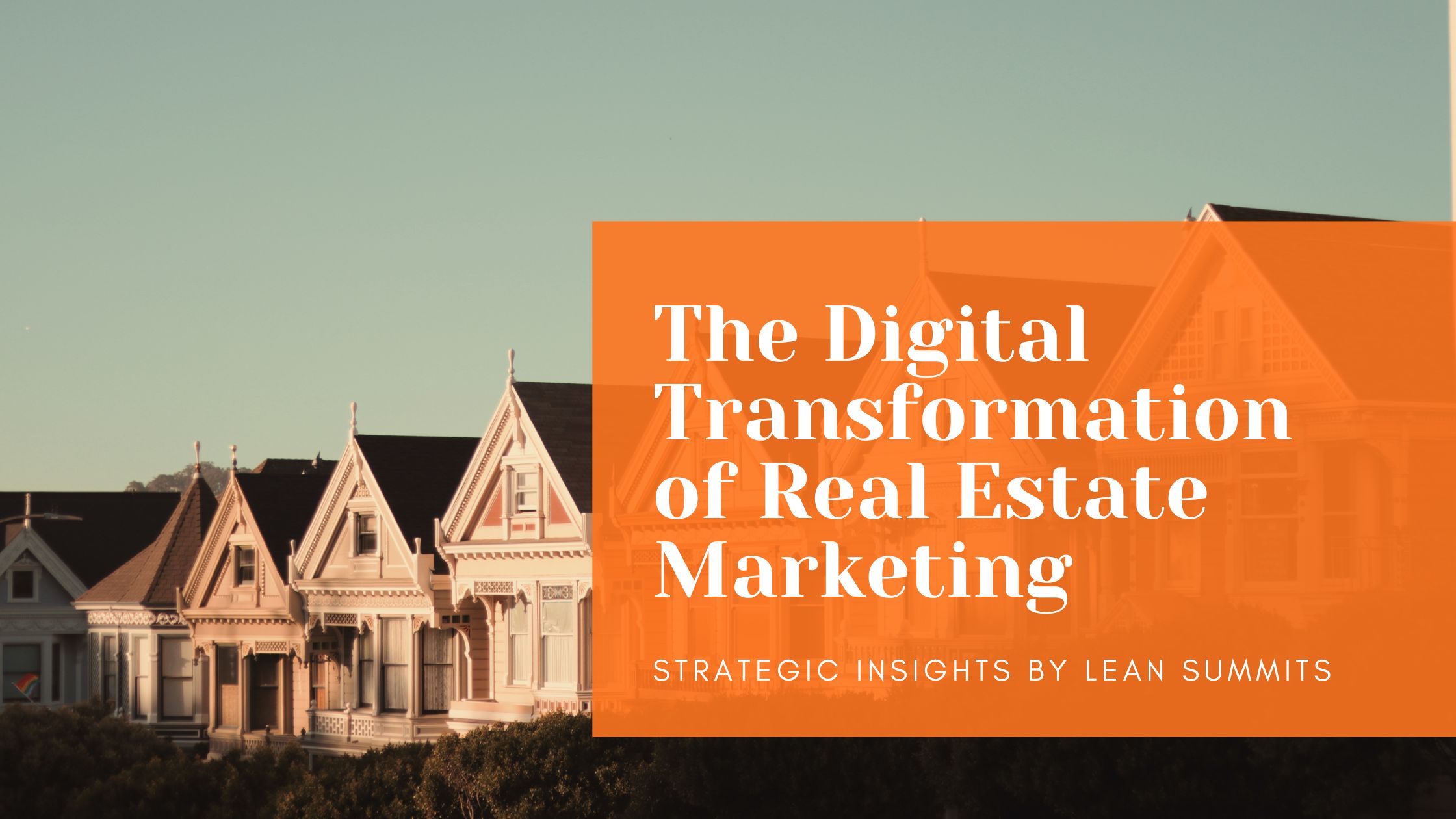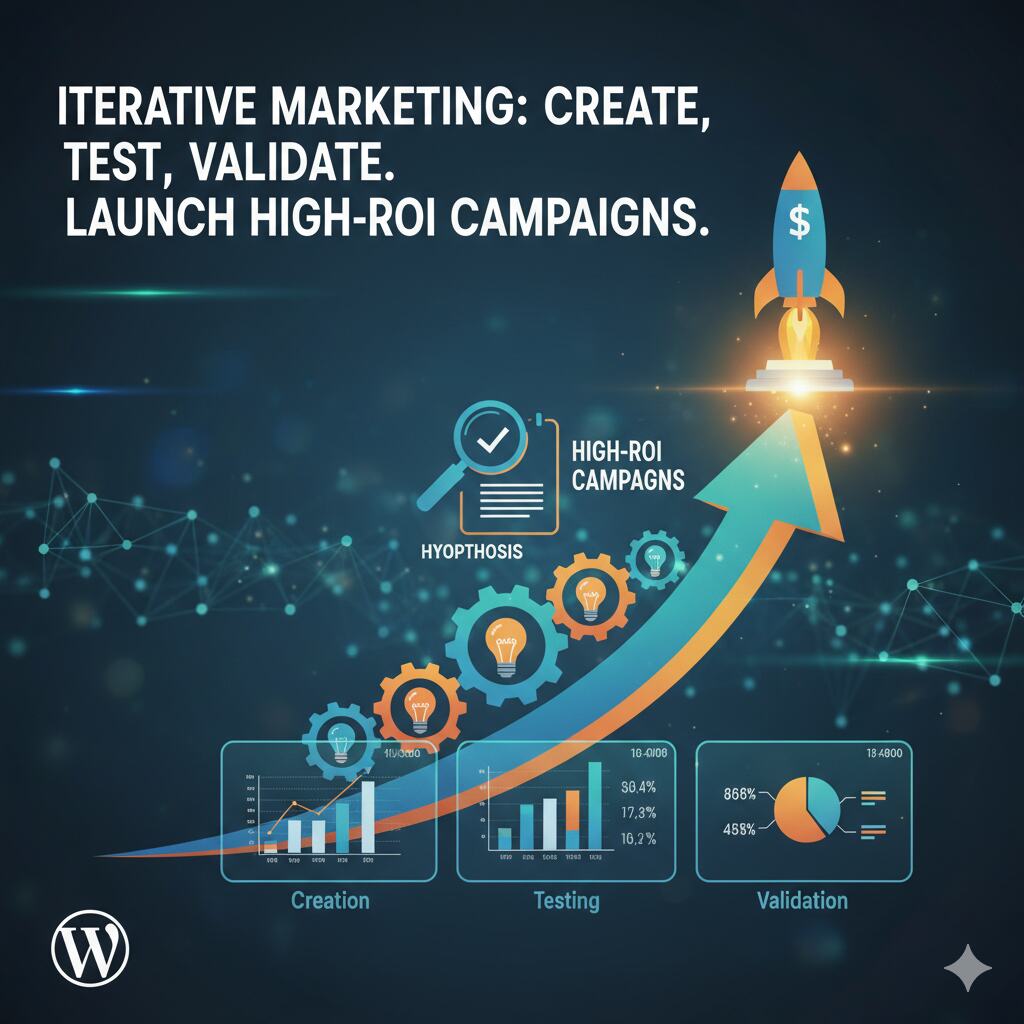Empowering Real Estate Excellence Through Data-Driven Marketing Strategies
Executive Summary
The real estate industry stands at a pivotal transformation point, driven by artificial intelligence integration, evolving consumer behaviors, and intensifying market competition. AI can automate 37% of tasks in real estate, representing $34 billion in operating efficiencies, while the global AI in Real Estate market size is expected to reach $988.59 billion by 2029 at 34.4% growth rate. This strategic insight reveals critical opportunities for real estate organizations to leverage digital marketing innovations, overcome traditional operational bottlenecks, and capture significant market share through sophisticated growth strategies. Our analysis identifies three fundamental shifts reshaping the industry: AI-powered automation replacing manual processes, data-driven decision making superseding intuition-based approaches, and omnichannel digital presence becoming essential for competitive advantage.
Key Strategic Implications:
- Organizations implementing focused digital marketing strategies achieve 2-3x lead generation growth
- AI adoption creates $34 billion in operational efficiency opportunities industry-wide
- High-converting real estate websites achieve 2.8-4.7% conversion rates versus 2% industry average
- Organic SEO investments deliver 90-160% traffic growth within 6 months
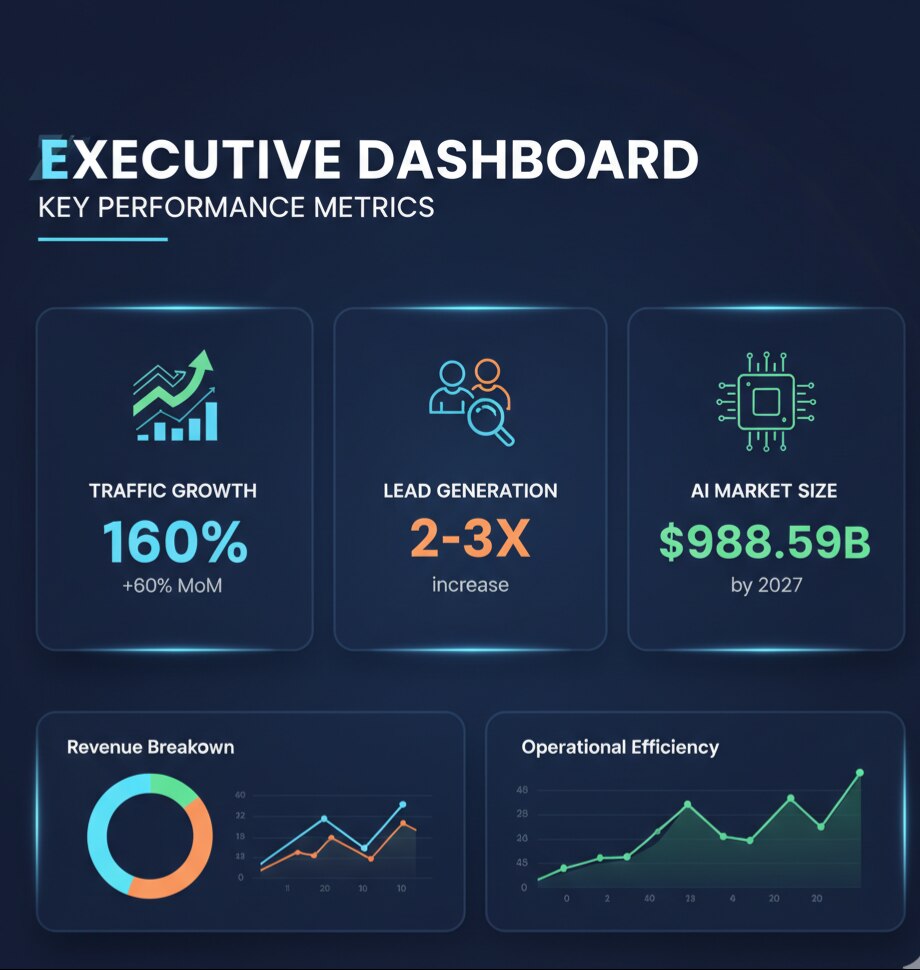
Market Context
Current Market Dynamics
The real estate sector faces unprecedented challenges that traditional marketing approaches cannot adequately address. Market fragmentation, increased broker competition, demographic shifts, and technological disruption have created a complex operating environment where conventional strategies yield diminishing returns.
Critical Market Forces:
- Competitive Saturation: The rising number of brokers and agents has intensified competition, making differentiation increasingly difficult through traditional methods.
- Operational Inefficiencies: Extensive paperwork and manual processes continue to slow growth and reduce profitability, creating friction in the customer journey.
- Digital Transformation Gap: According to McKinsey’s State of AI Report 2025, 78% of companies now use AI somewhere in their business, jumping from just 55% a year earlier, yet real estate adoption remains fragmented.
- Consumer Behavior Evolution: Modern buyers expect immediate access to information, virtual property experiences, and seamless digital interactions throughout their purchasing journey.
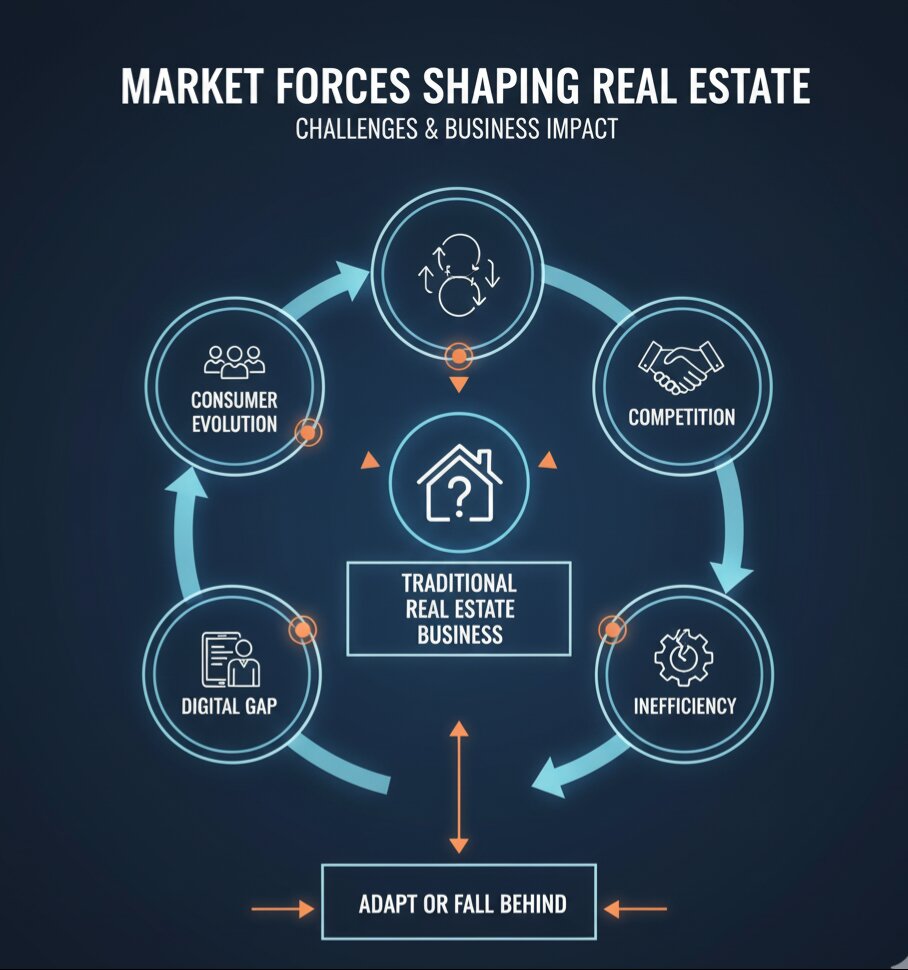
Technology Adoption Trends
SEO brings 53% of website traffic for agents, demonstrating the critical importance of digital visibility. Additionally, email marketing has an ROI of 3,600%, converts 40% higher than social media, and has an average open rate of 25% in the real estate industry, indicating significant untapped potential in automated communication systems.
The visual presentation revolution is equally compelling: homes with professional photos sell 32% faster and virtual tour listings get 40% more clicks, highlighting the critical role of high-quality content in accelerating sales cycles.
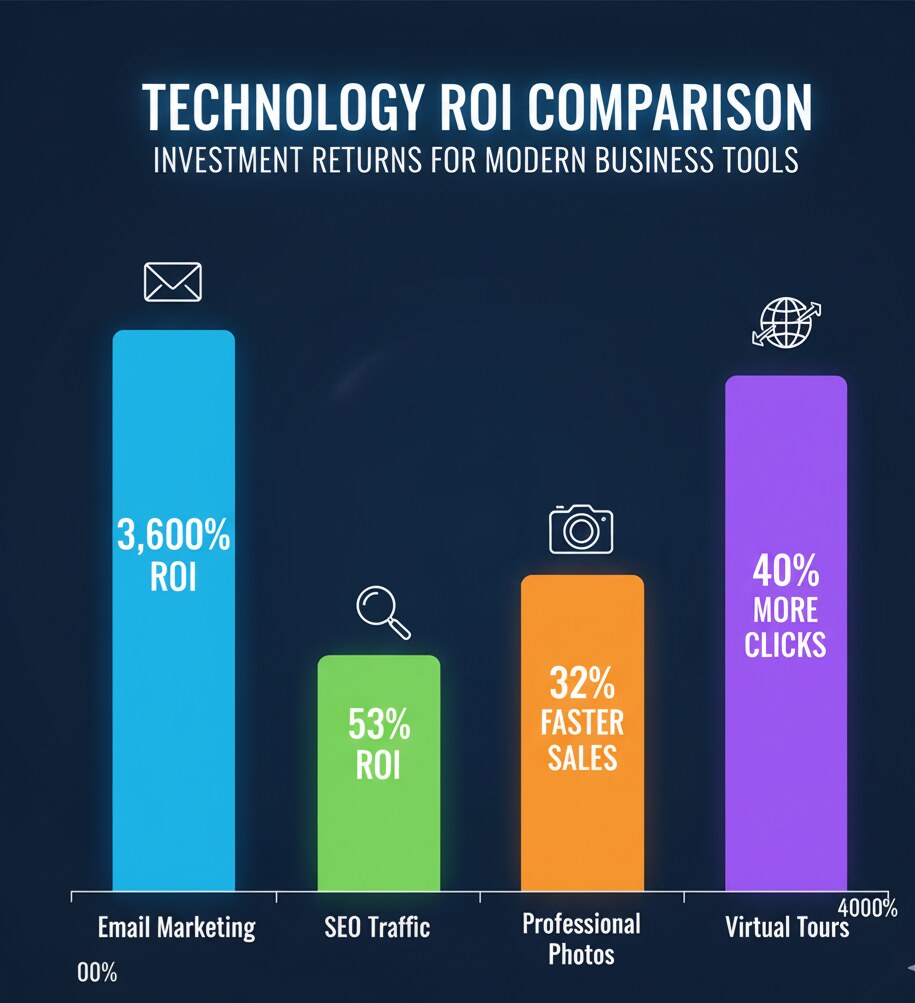
Market Performance Benchmarks
Industry conversion metrics reveal substantial opportunities for optimization. On average, the industry boasts a 4.7% conversion rate, with organic search achieving a 3.2% success rate. However, many organizations operate significantly below these benchmarks due to inadequate digital infrastructure and strategy implementation.
Key Insights
Insight 1: AI-Powered Automation Creates Exponential Efficiency Gains
The integration of artificial intelligence represents the most significant operational transformation opportunity in the history of real estate. Areas most likely to benefit from AI include management, sales and related activities; office and administrative support; and installation, maintenance, and repairs.
Strategic Implications:
- Automated lead scoring and nurturing systems can process unlimited prospect volumes
- AI-driven property valuation tools provide instant market analysis capabilities
- Predictive analytics identify high-conversion prospects before competitors
- Automated content creation scales marketing efforts without proportional resource increases
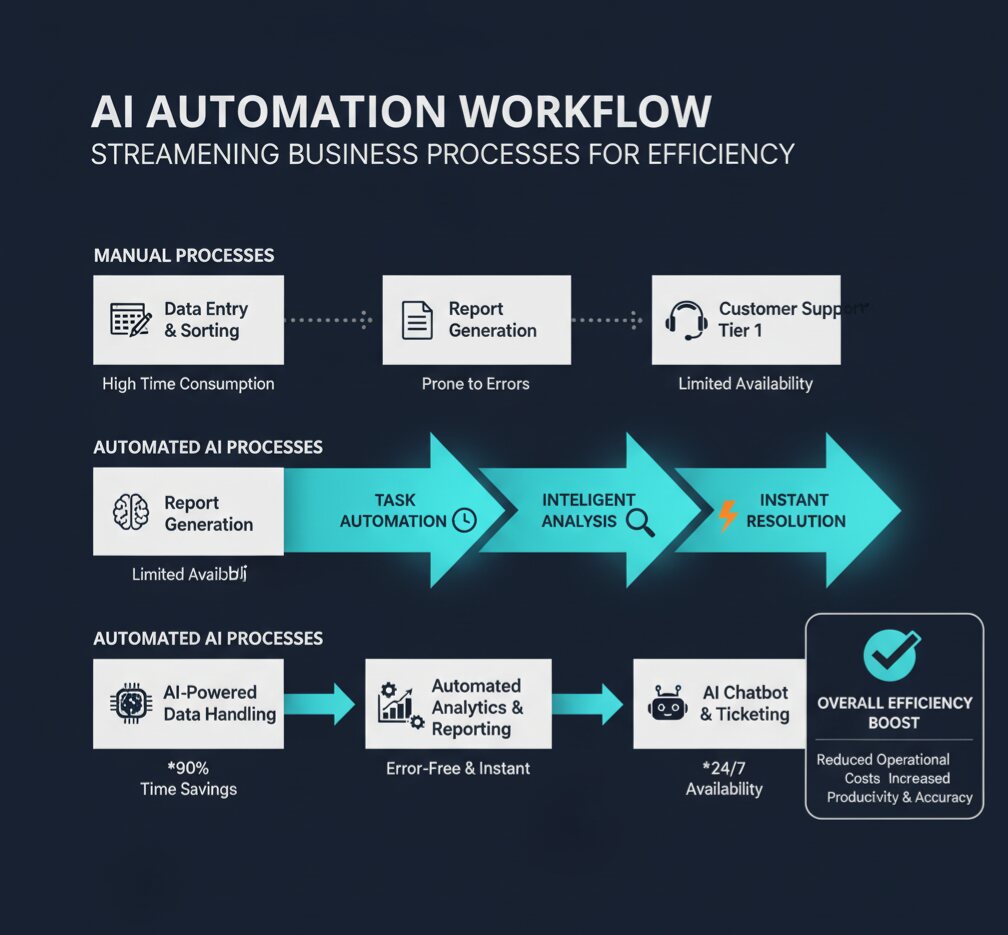
Insight 2: Digital Marketing Multiplies Lead Generation Capacity
Traditional real estate marketing approaches generate limited, inconsistent results. Our analysis reveals that organizations implementing comprehensive digital strategies achieve transformational growth metrics:
Performance Benchmarks:
- Traffic Growth: Focused SEO strategies deliver 90-160% organic website traffic growth within 6 months
- Keyword Optimization: Strategic SEO achieves top-page rankings for 20+ high-converting keywords
- Lead Generation Scale: Mid-size firms can grow from 35-50 leads/month to 110-160 leads/month (2- 3x growth)
- Conversion Optimization: High-performing websites achieve 2.8-4.7% traffic-to-lead conversion rates versus 2% industry average
Insight 3: Content Quality Directly Correlates with Sales Velocity
Visual presentation and content quality have become primary competitive differentiators. High-quality photos and interactive visuals are key to grabbing buyers’ attention. Listings with standout visuals not only catch more eyes but also accelerate decision-making processes.
Critical Success Factors:
- Professional photography reduces time-to-sale by 32%
- Virtual tours increase engagement by 40%
- Mobile-responsive design is essential for conversion optimization
- Clear, engaging content builds trust and accelerates prospect nurturing
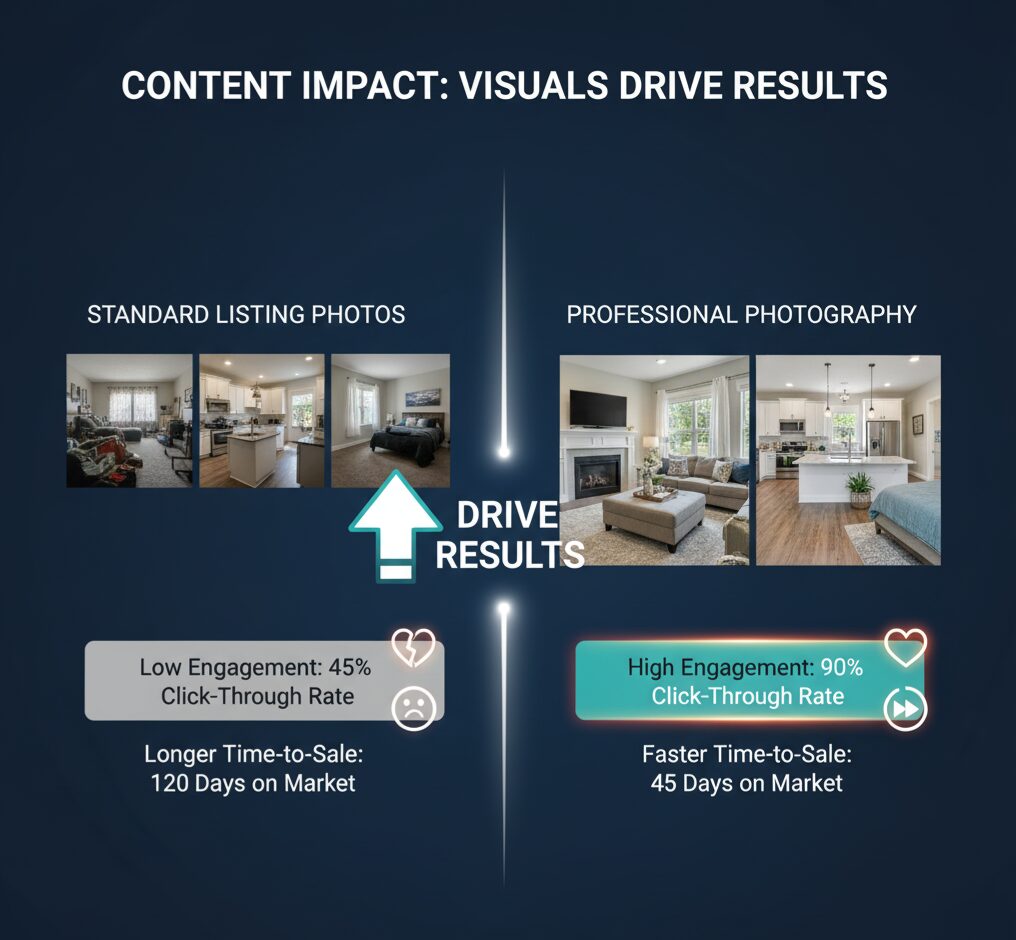
Insight 4: Multi-Channel Integration Amplifies Marketing ROI
71% of buyers choose agents with a strong social media presence, indicating that omnichannel presence has become a fundamental buyer expectation. Organizations that integrate multiple digital touchpoints create compounding marketing effects that exceed individual channel performance.
Strategic Implications
Opportunities
Immediate Growth Opportunities:
- SEO Optimization: Organizations can achieve 160% traffic growth within 6 months through focused search engine optimization
- AI Integration: Automation of 37% of operational tasks creates significant cost reduction and efficiency gains
- Lead Nurturing Systems: Extended sales cycles require sophisticated automated nurturing sequences that most competitors lack
- Content Marketing: High-quality visual content creates sustainable competitive advantages
Market Positioning Advantages:
- First-mover advantage in AI adoption within local markets
- Superior digital presence differentiates from traditional competitors
- Data-driven decision-making improves resource allocation efficiency
- Scalable systems enable rapid market expansion
Threats
Competitive Risks:
- Organizations failing to adopt digital strategies will face increasing market share erosion
- Traditional marketing approaches yield diminishing returns as buyer behavior evolves
- High lead acquisition costs without optimization strategies threaten profitability
- Manual processes create operational bottlenecks that limit growth capacity
Technology Disruption:
- New market entrants with superior digital capabilities can rapidly capture market share
- AI-powered competitors will have significant operational cost advantages
- Consumer expectations for digital experiences will continue accelerating
- Data privacy regulations may impact traditional lead generation methods
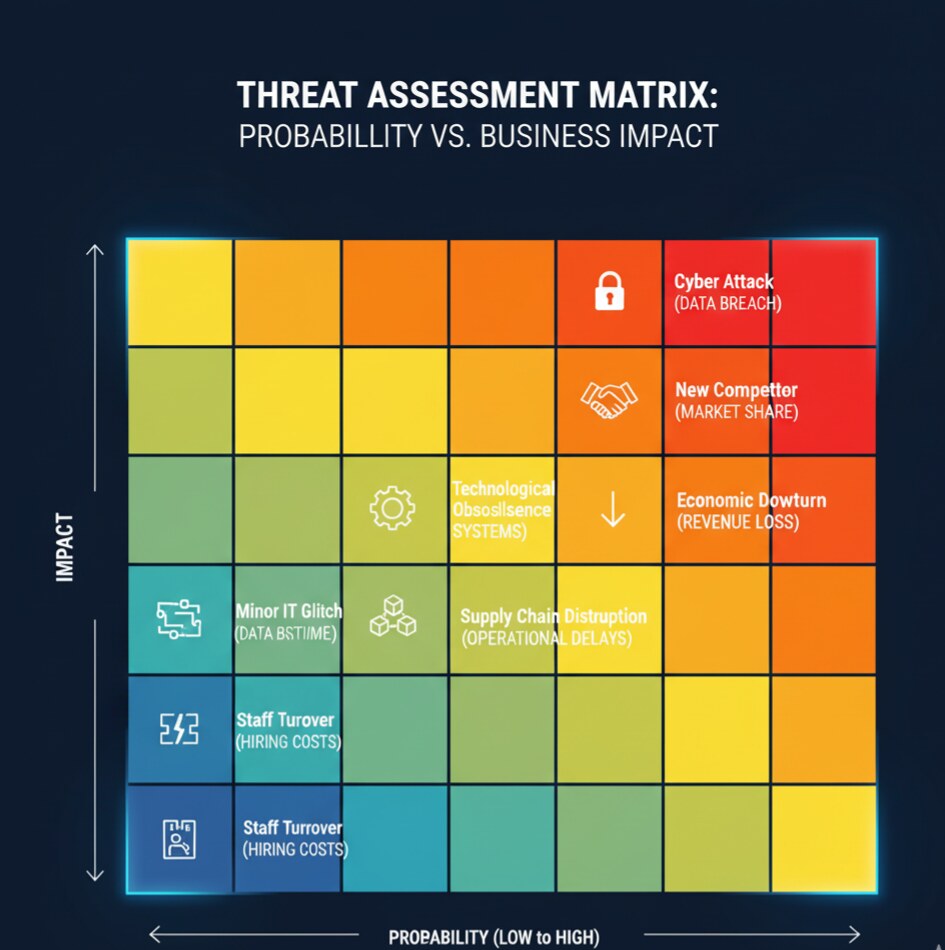
Recommendations
Immediate Actions (0-3 Months)
1. Digital Infrastructure Development
- Implement a mobile-responsive website with optimized conversion paths
- Establish professional photography and virtual tour capabilities
- Deploy email marketing automation with lead nurturing sequences
- Integrate the customer relationship management system with marketing automation
2. Search Engine Optimization Launch
- Conduct comprehensive keyword research for local market opportunities
- Optimize website content for 20 high-converting keyword targets
- Establish Google Business Profile optimization and review management
- Begin a content marketing strategy focused on buyer education
3. Lead Generation System Implementation
- Deploy tracking systems to measure traffic-to-lead conversion rates
- Create compelling lead magnets (market reports, buyer guides, property alerts)
- Establish social media presence across relevant platforms
- Implement retargeting campaigns for website visitors
Medium-Term Strategic Initiatives (3-12 Months)
4. AI Integration and Automation
- Implement AI-powered chatbots for initial prospect qualification
- Deploy predictive analytics for lead scoring and market analysis
- Automate repetitive administrative tasks through workflow optimization
- Integrate AI-driven property valuation and market analysis tools
5. Performance Optimization and Scaling
- Achieve target metrics: 2.8-4.7% website conversion rates
- Scale lead generation to 110-160 qualified leads per month
- Optimize cost-per-lead through channel performance analysis
- Expand geographic market presence through digital strategies
6. Advanced Content and Experience Strategies
- Develop virtual reality and augmented reality property experiences
- Create comprehensive video marketing programs
- Establish thought leadership content across industry publications
- Build strategic partnerships with complementary service providers
Long-Term Competitive Positioning (12+ Months)
7. Market Leadership Establishment
- Become a recognized digital marketing leader within the regional market
- Develop proprietary technology solutions for competitive advantage
- Create scalable systems for rapid geographic expansion
- Establish industry partnerships and strategic alliances
8. Innovation and Expansion
- Explore emerging technologies (blockchain, IoT, advanced AI applications)
- Develop franchise or licensing opportunities for successful systems
- Create additional revenue streams through technology consulting
- Build sustainable competitive moats through data and technology advantages
Implementation Success Metrics
Traffic and Visibility Metrics:
- 160% organic website traffic growth within 6 months
- Top-page Google rankings for 20 target keywords
- 25% increase in branded search volume
Lead Generation Performance:
- 2-3x monthly lead generation growth (110-160 leads/month target)
- 2.8-4.7% website conversion rate achievement
- 50% reduction in cost-per-qualified-lead
Operational Efficiency Gains:
- 37% task automation implementation
- 32% reduction in average time-to-sale
- 40% increase in prospect engagement rates
Revenue Impact Indicators:
- 25-40% increase in closed transactions
- 15-25% improvement in average commission values
- 30-50% reduction in marketing cost-per-acquisition
About Lean Summits Growth Marketing
Lean Summits specializes in data-driven growth marketing strategies that transform traditional businesses through digital innovation. Our cross-industry expertise brings fresh perspectives and proven methodologies to help real estate organizations achieve sustainable competitive advantages.
This strategic insight document has been developed by Lean Summits Growth Marketing Agency to help real estate organizations navigate digital transformation and achieve sustainable competitive advantages. For implementation support and customized growth strategies, visit www.leansummits.com.

